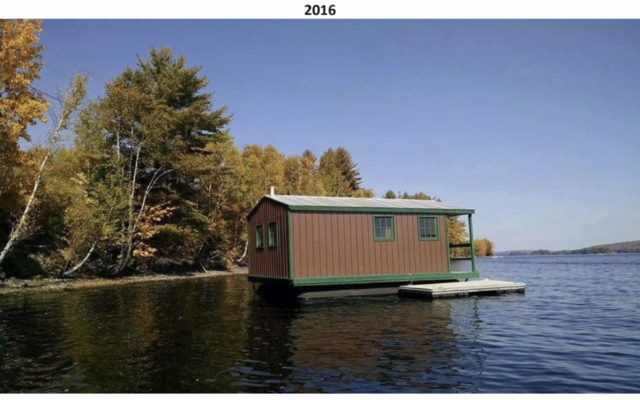
Bill to ban floating camps meets some opposition
By Julie Harris, Bangor Daily News Staff
Businesses that offer rentals of floating houses moored off their docks or in front of their companies were the only ones who opposed a bill that would ban floating camps on Maine’s waters during a legislative hearing on April 30.
They suggested adding a grandfather clause to protect the businesses like them, including floating restaurants.
The bill, L.D. 1763, An Act to Regulate Nonwater-dependent Floating Structures on Maine’s Waters, presented by Rep. Allison Hepler, D-Woolwich, would ban floating camps, which typically are anchored to lake bottoms or attached to docks.
The structures are essentially the same as camps on shore, but they are not subject to taxes or shoreland regulations like the land-bound buildings. Some have questionable waste disposal methods and block views from the shore. The state has no way to regulate them because its definitions for other watercraft, such as houseboats and homemade watercraft, are too vague.
This bill clearly defines various watercraft, including houseboats and anything homemade, plus docks, moorings and nonwater-dependent floating structures. Wednesday’s public hearing was the next step in the process toward reaching a full vote in the Legislature.
It also sets up a fine system that would charge from $100 to $500 per day for violations, and an enforcement structure that would allow the state, municipalities or other authorities to take possession of floating camps and dispose of them however they wish.
Officials from various state departments including Inland Fisheries and Wildlife, Agriculture, Conservation and Forestry and Marine Resources testified in favor of the bill, laying out how they came to propose the bill and why it is necessary.
Christl Theriault, assistant to DIF&W Commissioner Judy Camuso, said the proposed legislation would close a current loophole in the law that allows people to throw a motor on anything and register it as a boat.
She estimated there are 30-40 floating camps currently on Maine’s inland waters.
Others in favor of the bill cited environmental concerns about unregulated discharges. One person said she heard that in one case, renters were told to use the lake for a toilet.
Another said that in one case, a person moved a floating camp elsewhere on a lake to get out of the jurisdiction of the Land Use Planning Commission.
The biggest concern by the Legislature’s Standing Committee on Inland Fisheries and Wildlife, a marine trades group and two business owners was the economic impact the potential law would have on businesses that have or are in floating structures, such as DiMillo’s On the Water restaurant.
DeMillo’s has been moored at a marina in downtown Portland since 1982.
Neil Collins, general manager for Robinhood Marine Center in Georgetown said the business has rental houses floating on moorings, which keeps staff employed year-round. The Army Corps of Engineers has inspected and approved the houses, he said.
Without a grandfather clause in the bill to protect them, the company would be forced to close for part of the year and lay off employees, he said.
Former State Rep. Kent Ackley testified that his Nautilus water house, tied to the end of a dock jutting from his privately owned 1 Big Sustainable Island on Annabessacook Lake in Monmouth would become illegal without the grandfather clause.
The house, which has been registered as a boat for the last two years and is a navigable craft, is environmentally friendly, he said. He uses it for several short-term rentals over the summer season.
Theriault said that DIF&W was concerned about the impact on businesses too, and would discuss a grandfather clause and other options to minimize it.
The IF&W committee requested additional information from the businesses and the state departments for the work session expected to be scheduled soon. The committee will consider amendments and vote ought-to-pass or ought-not-to-pass at the end of the work session before sending the bill to the full Legislature.